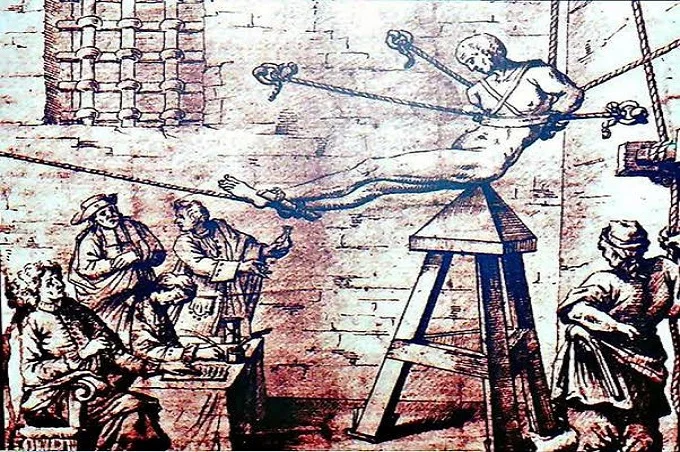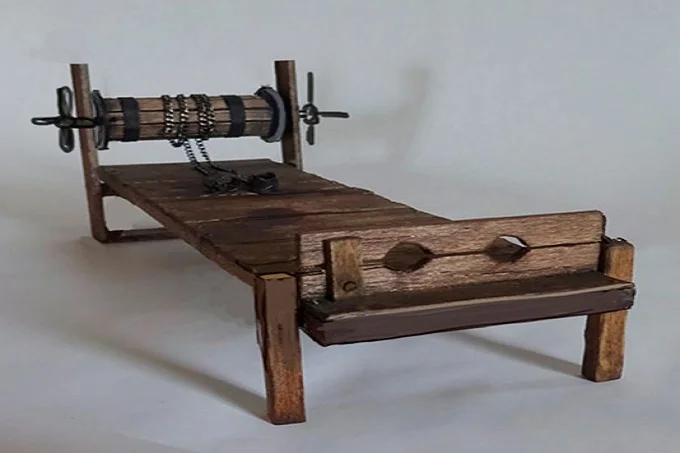According to historians, most tortures were used during the Medieval time. It is enough only to see the instruments of torture to understand how cruel the mores of that time were. The Inquisition contributed to the appearance of many terrible tools of executioners. Our article contains the most popular in Medieval times and the most shocking torture methods.
1. The Cradle of Judas

The cradle of Judas is quite simple in design: this is a chair with a metal or wooden pyramid on top. The principle of its operation was also incredibly simple. The victim was stripped naked, tied with ropes, and hung over the device. Then it was lowered very slowly until the sharp end of the pyramid penetrated into the rectum or vag!na.
Sometimes the victim was also swung or lifted and lowered several times to inflict great damage. In extreme cases, a person was left in such a position at night so that he would suffer until morning. Considering that the device was never cleaned, many people died from blood poisoning.
2. The Iron chair torture
The idea was that people were put on a chair with 500 to 1500 nails sticking out of the seat and back. The pain increased because the chair was built so that no vital organs were touched – death took from several hours to a little more than a day. The chair also had special holes under the victim’s feet, where burning coals were often placed.
The Iron Chair was often employed as a psychological torture device; victims were often persuaded to confess after seeing other captives being tormented by the instrument.
3. Torture Rack
The rack was a special bed with rollers on which ropes tied to the victim’s arms and legs were wound. If the victim did not confess during the interrogation, the executioner turned the handles on the rollers, pulling the ropes until the bones began to break and the joints burst. If the interrogation persisted, he was stretched on the rack until his arms and legs were pulled out of his body.
There were also versions of the rack, in which the rollers were studded with spikes that tore the victim’s body.
4. The Brazen Bull
This instrument of torture and execution was created in ancient Greece by the coppersmith Perillos, who proposed a similar idea to Phalaris, the tyrant of the city of Agrigento. When Perill finished building the bull, Falarid ordered that the device be tested on him.
A person was placed in a cavity inside the bull, after which a fire was lit under it. Holes were made in the area of the nostrils of the structure, through which the victim’s screams could be heard, similar (due to the design features) to the roar of a bull.
5. Burial alive
One of the nightmares of people who suffer from claustrophobia is being buried alive. In reality, the victim was often buried up to his neck in the sand so that animals, birds, or insects could eat a helpless person alive.
6. Coffin Torture
During the Medieval Period, this was one of the terrifying types of torture.
The accused were confined in a caged coffin that rendered them absolutely immobile. The offense decided the length of imprisonment, with serious crimes, such as blasphemy, carrying the death penalty. Victims were often shown in public, where they were humiliated and tormented by angry villagers.
7. Torture by rats
This torture was very popular in ancient China. The bound victim was placed on a table and a cage with hungry rats was placed on his stomach. Before that, many incisions were made on the abdomen. Hot coals were placed on top of the cage to further spur the rats. Fleeing from the heat, the rats gnawed through the man’s stomach.
8. Saw torture
Sawing may seem like an extreme form of punishment, but it has often been used worldwide. The victim was tied upside down, after which they began to saw from the groin to the head.
9. The boot torture
Crushing bones and limbs was a common kind of torture in medieval times, given the ease with which the devices were designed and constructed. The boot, or ‘Spanish boot,’ as it was often known, was a rack for the legs that were worn within tight-fitting iron or wooden boots. After that, wooden wedges would be inserted, and mallets or hammers would be used to force the wedges in even tighter, causing the victim’s feet to shatter.
10. Thumbscrew torture device
This simple device was considered one of the most efficient torture techniques in late medieval and early modern Europe. Its basic design, which resembled that of a vice, comprised of two metal plates into which the victim’s thumb was inserted, and the vice tightened. The device’s inside sometimes included projecting studs, making the crushing of bones even more painful.
Metal points would puncture the nails and flesh. The thumb screw’s benefit to the torturers was that it seldom resulted in death or caused the victim to pass out, allowing them to continue the brutal practice for longer periods.
